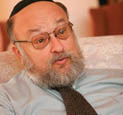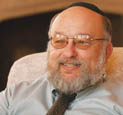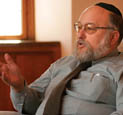Entre Nous with Barry Levy, Dean of the Faculty of Religious Studies
Entre Nous with Barry Levy, Dean of the Faculty of Religious Studies McGill University
User Tools (skip):
Entre Nous with Barry Levy, Dean of the Faculty of Religious Studies
Religious studies: the inner and outer reaches
 |
 |
 |
Barry Levy has seen a shift in attitudes towards
religion.
Owen Egan
This May marks the end of Barry Levy's tenure as dean of Religious Studies, a position he assumed in 1997. In recent years, the study of religion has assumed increasing importance due to crises ranging from the individual to the global. Levy looks back — and forward.
The broad perception is that there been rising interest in religion since September 11, 2001, and the Faculty is hosting a major conference, "World Religions After 9/11," this summer. How has 9/11 affected our understanding of religion?
Everyone realizes that 9/11 is a watershed date in terms of religion, but what it represents is a matter of dispute. When I became dean in 1997, religion was already making a major comeback. September 11 heightened the focus of the average person on the religious culture that contributed to the events of that day. Professor Arvind Sharma, who for many years has been travelling the world to build support from religious leaders and academics for an international religious bill of rights, has organized "World's Religions After 9/11," a major international conference drawing thousands of researchers to Montreal. But while "9/11" is the catchy peg that everyone recognizes, the real shift in attitudes toward religion began as long as two decades ago.
What lies at the root of this shift?
Religious education was, traditionally, a function of the family. But the family has changed over recent years so it doesn't always provide that education. Many people who have been raised in secular environments have since begun studying religion, their own and others, to learn more about its pre-modern contribution to human existence and to discover that which may still be relevant. Sometimes people are studying with the hope of finding some kind of religious modus vivendi, or sometimes just to understand their neighbours better.
People who want this religious knowledge seek it wherever they can, which could be in the university, but could also be at a fundamentalist house of worship if that is what's available. And worldwide, religions have experienced a fundamentalist tilt. How this gets resolved will have a profound effect on society.
What is the intellectual role of units like the Faculty of Religious Studies in the wake of this shift?
One of our goals, which has now been listed as a university priority, is to create an Institute for Interfaith Studies that would involve graduate programs to prepare public leaders to deal with the contemporary religious landscape. It would include a focus on religion in Western democracy, religious systems and the relation of religion to other areas such as economics and ethics.
We also need to explore how modernity affects religious traditions. Consider the role of media and the way access to information changes the nature of religion. Access to material is mushrooming — religious knowledge is available not just to initiates but to anyone who wants it.
What would you like to see for the future of religious studies at McGill?
We would like to see closer communication with other faculties. There are units in the arts — Jewish, Islamic and Catholic studies programs — looking at religious cultures from other perspectives, and we have over the years discovered commonalities with medicine, law, and music, among others. For instance, in medicine there is a growing awareness of the role of spirituality in healing patients. The other day I spent an afternoon with other clergymen and doctors talking with medical students about what it means to have patients who identify with a religious tradition and how that affects their role as doctors. There is a lot of interest out there in what we are doing.
The teacher's path: Barry Levy's first job
The first real job I had was teaching religious classes in Judaism to young children in supplementary programs running a few hours on Sunday morning or maybe some afternoons and evenings a week. I was hired when I was in high school, and was actually too young to drive; my father had to drive for me. I have worked as a teacher of one form or another ever since.

